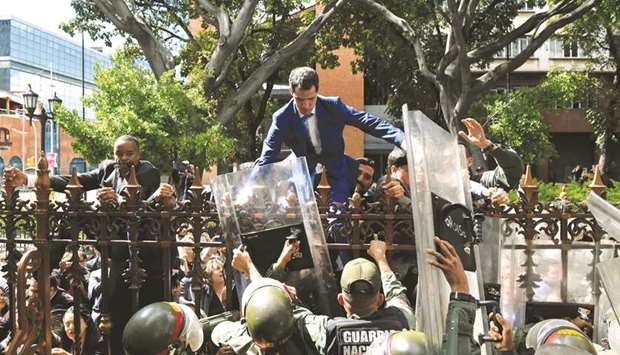The Lima Group regional bloc said yesterday it backed the re-election of opposition leader Juan Guaido as head of Venezuela’s Congress after Nicolas Maduro’s socialist government forced a separate vote imposing a new leader of the legislative body.
Luis Parra was installed as the new head of Congress on Sunday after armed troops blocked opposition legislators from entering parliament, in a move condemned by dozens of nations as an assault on democracy.
Opposition legislators responded by re-electing Guaido in a session at the headquarters of a pro-opposition newspaper.
Guaido is recognised by dozens of nations as Venezuela’s rightful leader.
The Lima Group, minus members Mexico and Argentina, said they welcomed Guaido’s re-election as the leader of Congress and as the country’s interim president, repeating a condemnation of “force and intimidation tactics” used against lawmakers.
The re-election of Guaido “represents a rejection of the reckless actions by Nicolas Maduro’s regime that sought to prevent his appointment,” said the group, which was set up to find a way out of the Venezuelan crisis.
The Lima Group statement was signed by Brazil, Canada, Chile, Colombia, Costa Rica, Guatemala, Honduras, Panama, Paraguay, Peru and Bolivia, the last of which joined the bloc in December after the resignation of leftist leader Evo Morales.
Argentina’s new centre-left Peronist President Alberto Fernandez has been walking a tightrope between key trade partners including Brazil and the United States and potential leftist allies including Venezuela. The South American country has given asylum to socialist former Bolivian leader Morales and welcomed a senior official from Maduro’s government to Fernandez’s inauguration in December, prompting criticism from the United States.
But Argentina’s foreign minister, Felipe Sola, said on Twitter that his government rejected the move in Venezuela to block the proper functioning of the legislative assembly which would only lead to “international isolation.”
“The assembly must elect its president with full legitimacy,” he wrote.
In Caracas on Sunday, Guaido and Parra both claimed to be Venezuela’s parliament speaker on Sunday following two separate votes and accusations of a “parliamentary coup.”
Guaido was re-elected speaker by opposition lawmakers in a session held at a newspaper office after police blocked him from entering the National Assembly legislature.
In his absence, corruption-tainted Parra proclaimed himself speaker after claiming to have been elected with 81 votes in the 167-member chamber.
Guaido, who a year ago declared himself acting president in a challenge to socialist leader Nicolas Maduro, received the votes of around 100 lawmakers, including several forced last year into exile or to take shelter in foreign diplomatic missions due to a regime crackdown.
Guaido vowed to “enforce” the constitution in his dual role as parliament speaker and “acting president.”
But in a televised address, Maduro gave his backing to Parra as the new speaker, adding that “Guaido was kicked out of the National Assembly by the votes of his own opposition.”
Venezuela’s opposition denounced Parra’s move as a “parliamentary coup.”
Guaido and around a dozen lawmakers had been prevented from entering the assembly by police claiming to be carrying out a security operation, but deputies from Maduro’s party and opposition ones that have rejected Guaido were allowed in.
Guaido, 36, attempted to climb over the railing around the National Assembly premises to gain entry, only to be pushed back by police with riot shields.
Images of Parra declaring himself head of the chamber by megaphone were shown on state television channel VTV.
After spending four hours outside parliament, Guaido and allied lawmakers went to the offices of El Nacional newspaper where they held their own session.
“This is unprecedented!” Guaido told a member of the security forces with whom he had a heated exchange. “What operation? Who ordered it?”
“Those who help to prevent the legitimate installation of the Venezuelan parliament are converting themselves into accomplices of the dictatorship,” he wrote on Twitter.
Guaido has led the National Assembly for the last year and used that role to declare himself acting president on January 23, 2019 after parliament had branded Maduro a “usurper.”
The US congratulated Guaido on being re-elected as speaker and said it condemned “the failed efforts of the former Maduro regime to negate the will of the democratically elected National Assembly.”
“The United States and 57 other countries continue to regard (Guaido) as the legitimate leader of the National Assembly and thus the legitimate interim president of Venezuela,” US Secretary of State Mike Pompeo said in Washington.
The National Assembly has 167 seats, 112 of which are in opposition hands.
On Twitter, the National Assembly described Parra’s claims as “a violation of the constitution.”
Brazil’s Foreign Minister Ernesto Araujo said his country “does not recognize” Parra’s claims, while Colombia described Parra’s election as “fraudulent, without transparency or guarantees” and said it wouldn’t recognse it.
The National Assembly has been effectively sidelined since 2017, when the Supreme Court, made up of Maduro loyalists, declared it in contempt.
The court has since annulled its every decision.
Maduro has said he expects to “regain the National Assembly” in elections later this year.
International / US/Latin America
Lima Group supports Guaido re-election as Venezuela Congress splits

Venezuelan opposition leader and self-proclaimed acting president Juan Guaido is helped climb a railing in an attempt to reach the National Assembly building in Caracas on Sunday.
